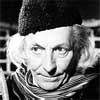PLOTLINE
In this exciting reading of a Doctor Who novelisation, first published by Target
Books in 1989, the Doctor and his companions must travel across time and space
in an attempt to escape from the Daleks. This is a chase to the death...
Read by Maureen O'Brien, with Nicholas Briggs as the Dalek voices.
COMMENT
I had been looking forward to this AUDIOGO unabridged (5 CD) novelisation reading by Maureen (Vicki) O’Brien of John Peel’s adaptation of Terry Nation’s DOCTOR WHO – THE CHASE (published in the DOCTOR WHO Target series in 1989) for some time as it’s my favourite Hartnell story, but, I have to say, purely for sentimental reasons for it’s light years from Nations best work.
And whilst the Mechanoids looked vaguely like gussied-up refrigerator transportation boxes but no matter, I was a six-year old when seeing the story (a 1965 six-parter) and it’s one of the few early DOCTOR WHO stories that I can remember with anything bordering on clarity. How can you go wrong with a frantic chase through time, pursued by the Daleks? Additionally, the story is notable because Ian and Barbara leave the TARDIS at the end of the serial, while astronaut Steven Taylor (Peter Purves shortly before his BLUE PETER halcyon years) joins Vicki and the Doctor for the next serial. The serial was released on videocassette in 1993 and, finally, on DVD in 2010 in a boxed set with DOCTOR WHO – THE SPACE MUSEUM.
Reassuringly, Maureen’s pleasant “book at bedtime” tone & delivery presents the assorted characters with subtle differences that don’t feel like parody (sometimes whenever female readers perform male voices - and vice versa - it’s an acid test of the performer’s ability); if they fail to sustain your suspension of disbelief, then they’ve not done their job. Martin Jarvis, pretty much undisputed King of audiobook Readers (his P.G. Wodehouse readings are, it goes without saying, flawless) is the best example of a reader who can cover male and female character voices without sounding like a duffer. The trick is to keep it subtle: and Maureen scores a bulls-eye because all she does is slightly lower her voice to represent the male characters; she has to make her voice noticeably higher to reproduce Vicki and nails Hartnell’s querulous tones.
Nick Briggs, ‘Mr Dalek’, gives us the voices of the ‘golden age’ Daleks and forgets the New Model chubby buffoons on offer with Matt and Karen; these are the real deal, borderline insane, ranting loons, they are scary because they are beyond human reason and have no shame. This was when the deranged aliens persistently shriek ‘Exterminate!’ over and over and over, ad nauseam, like some dustbin-wearing Greek chorus in a madhouse performance of THE SEVEN KEYS TO DOOMSDAY! But he does not provide the voice of the Mechanoids. Big mistake. Poor Maureen is left to voice them and so we do not get the deathless line delivered in loud, halting, clipped, mechanical tones: Enter. Enter. Zero. Stop. OK, that’s not in Peel’s novelisation either but it’s in the telly version and so I still think it should have been shoehorned in here as a key sound-effect.
The story is not complicated: all that’s on offer here is a chase and that’s it but it’s a Dalek chase and so go with it. The Doctor and his companions are pursued from a desert planet (Aridius, a bit on the nose, but they were simpler times), briefly to New York for a mean-spirited encounter with a loud-mouthed hick (Peel tells us that the chap spent the rest of his life detained on mental health grounds due to his stories of vanishing people and robots), the Marie Celeste, then to a faux haunted house (Surprisingly, the Daleks aren’t too good on stairs!) and finally to Mechanus, a jungle planet, for the finale with the Mechanoids and Nation’s attempt to surpass the Daleks. He fails. The highlight of the Mechanus story is the fight between the Doctor and his Dalek-constructed robot duplicate but it should have been over-shadowed by the debut of the Mechanoids; that it is not underlines the argument that they are a profound study in failed character design.
Peel tries in passing to add depth to the TARDIS crews personalities and relationships but he appears to be hobbled by the TARGET editorial diktat to keep it brief and simple for a young audience and so while the Doctor’s affection for Ian and Barbara moves him to tears when they leave, this is covered in a couple of sentences.
In fairness, that’s how it played on screen but the written word offers the opportunity to flesh out emotional depth and so these moments play like missed opportunities. The point is that anyone more accustomed to the relatively stormy and indeed passionate relationships of the RTD era Doctors may be bemused by the sterility on offer here but that is not Peel’s fault. If you go into this remembering that this is a children’s (pre-teen) book, then you will probably enjoy this as a competent account of a pretty workmanlike bit of telly writing. Peel is making the best of a bad job; sandwiched between the limitations of the TARGET imprint and a Terry Nation story that feels worryingly like work done during a lunch break to meet a deadline.



